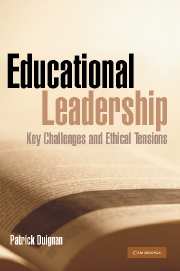Book contents
- Frontmatter
- Contents
- Acknowledgements
- Introduction and overview
- 1 Contemporary leaders and leadership under the spotlight
- 2 Key challenges for educational leaders
- 3 Leadership challenges as tensions
- 4 A framework for analysing tensions
- 5 Values and ethics in decision-making
- 6 A method for ethical decision-making
- 7 Shared and distributed leadership in schools
- 8 Why we need capable educational leaders
- 9 Why we need authentic educational leaders
- 10 Forming capable and authentic educational leaders
- References
- Index
2 - Key challenges for educational leaders
Published online by Cambridge University Press: 05 June 2012
- Frontmatter
- Contents
- Acknowledgements
- Introduction and overview
- 1 Contemporary leaders and leadership under the spotlight
- 2 Key challenges for educational leaders
- 3 Leadership challenges as tensions
- 4 A framework for analysing tensions
- 5 Values and ethics in decision-making
- 6 A method for ethical decision-making
- 7 Shared and distributed leadership in schools
- 8 Why we need capable educational leaders
- 9 Why we need authentic educational leaders
- 10 Forming capable and authentic educational leaders
- References
- Index
Summary
The challenges in this chapter and the tension situations in the next chapter are accompanied by explanatory or illustrative cases. Some of the details of these cases have been changed to help ensure anonymity without affecting their key messages.
Providing a values-driven vision
One of the distinguishing characteristics of successful educational leaders is their capacity to provide a vision for the future and inspire hope in those with whom they work. They also lift the spirits of their people and help them to translate the vision into the daily practices of their work. In this way they help to inject meaning into the daily grind of getting the work done, thereby providing a sense of purpose and direction.
The articulation of vision necessarily involves leaders sharing their hopes, desires and expectations with the members of the school community, and establishing the foundations of an organisational culture that supports the aspirations of all stakeholders. The intent and content of the vision helps motivate all the members of the school community. Reflection on, and communication of, this vision is essential if it is to become part of everyday practice.
Linking vision to practice seems to be a vital component in the relationship of the leader and those led. Drawing people beyond their daily tasks and routines and engaging them in helping to shape a desired future facilitates the creation of a more meaningful and inspiring workplace.
- Type
- Chapter
- Information
- Educational LeadershipKey Challenges and Ethical Tensions, pp. 21 - 41Publisher: Cambridge University PressPrint publication year: 2007



